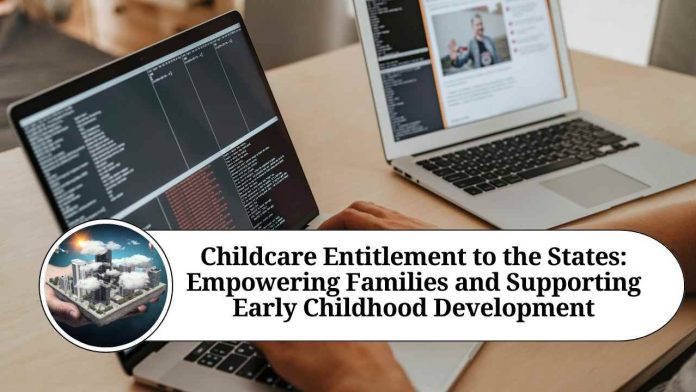Introduction
Ensuring accessible and affordable childcare is a critical component of supporting families and promoting early childhood development. Recognizing this, governments worldwide have implemented various policies and entitlements to address the childcare needs of their citizens. In this blog, we will explore the concept of childcare entitlement to the states, examining how it empowers families and contributes to the overall well-being of children.
Understanding Childcare Entitlement:
Childcare entitlement refers to the provision of financial support, resources, and services by the government to ensure that families have access to high-quality childcare options. It recognizes the importance of early childhood education and care as a vital foundation for a child’s development and future success.
Benefits of Childcare Entitlement:
a) Affordability: One of the key advantages of childcare entitlement is its ability to alleviate the financial burden on families. By providing subsidies, vouchers, or tax credits, governments can make childcare more affordable, enabling parents to pursue employment opportunities or education while knowing their children are well-cared for.
b) Accessibility: Childcare entitlement programs aim to improve access to quality childcare services for families, particularly those from disadvantaged backgrounds. By promoting inclusivity and reducing barriers, such as location or cost, these programs ensure that every child has equal opportunities for early learning and socialization.
c) Early Childhood Development: High-quality early childhood education and care have a profound impact on a child’s cognitive, emotional, and social development. Childcare entitlement programs often emphasize the importance of quality standards, such as well-trained educators, age-appropriate activities, and safe environments. By providing access to these standards, children can thrive and reach their full potential.
d) Workforce Participation: Accessible and reliable childcare options enable parents, particularly mothers, to participate in the workforce. Childcare entitlement programs recognize that supporting working parents benefits both the individual families and the overall economy. By facilitating workforce participation, these programs promote economic growth and reduce income inequality.
Implementation and Challenges:
a) Funding: Implementing comprehensive childcare entitlement programs requires significant financial investment. Governments must allocate adequate resources to ensure the sustainability and effectiveness of such programs. Funding can come from a variety of sources, including public budgets, taxes, and partnerships with private entities.
b) Quality Assurance: Maintaining high-quality standards in childcare facilities is essential for optimal child development. Governments must establish robust regulatory frameworks, monitor compliance, and provide training and support to childcare providers. Regular inspections and ongoing evaluations help maintain the quality of care offered to children.
c) Coordination: Childcare entitlement programs often involve collaboration between different government agencies, departments, and stakeholders. Effective coordination and communication are crucial to streamline services, eliminate duplication, and address any gaps in service delivery. It requires interagency cooperation, data sharing, and a holistic approach to ensure comprehensive childcare support.
Conclusion
Childcare entitlement to the states represents a commitment to the well-being of children and families. By prioritizing accessible and affordable childcare options, governments empower families, support early childhood development, and foster a more inclusive society. Ensuring that every child has access to high-quality care is an investment in the future, shaping a generation that is prepared to thrive academically, socially, and economically. As we move forward, it is vital for governments to continue strengthening and expanding these programs, recognizing their essential role in building a brighter future for our children.
Other Related Blogs: Section 144B Income Tax Act
Frequently Asked Questions (FAQs)
Q. What is childcare entitlement?
Childcare entitlement refers to the provision of financial support, resources, and services by the government to ensure that families have access to affordable and high-quality childcare options. It aims to support families in meeting their childcare needs while promoting the well-being and development of children.
Q. What are the benefits of childcare entitlement programs?
Childcare entitlement programs offer several benefits, including:
Financial assistance: They alleviate the financial burden on families by providing subsidies, vouchers, or tax credits, making childcare more affordable.
Increased accessibility: These programs improve access to quality childcare services for families, particularly those from disadvantaged backgrounds, ensuring equal opportunities for all children.
Early childhood development: Childcare entitlement programs prioritize quality standards, promoting the cognitive, emotional, and social development of children through well-trained educators, age-appropriate activities, and safe environments.
Workforce participation: By providing accessible and reliable childcare options, these programs enable parents, especially mothers, to participate in the workforce, benefiting individual families and the overall economy.
Q. How are childcare entitlement programs funded?
Funding for childcare entitlement programs can come from various sources, including public budgets, taxes, and partnerships with private entities. Governments allocate resources to support the sustainability and effectiveness of these programs, recognizing their importance in supporting families and early childhood development.
Q. How does childcare entitlement ensure the quality of childcare services?
Childcare entitlement programs often establish quality assurance measures to ensure the well-being of children. This includes implementing regulatory frameworks, conducting regular inspections, and providing training and support to childcare providers. These efforts help maintain high-quality standards and ensure children receive the best possible care.
Q. Do childcare entitlement programs cater to different age groups?
Yes, childcare entitlement programs typically cater to various age groups, including infants, toddlers, and preschool-aged children. They focus on age-appropriate care and educational activities to support the developmental needs of each age group.
Q. Are childcare entitlement programs available to all families?
Childcare entitlement programs aim to be inclusive and accessible to all families. While specific eligibility criteria may vary depending on the state or country, these programs often prioritize families with lower incomes, single parents, parents pursuing education or training, and families with special needs children. The goal is to support families who face financial or other barriers in accessing quality childcare.
Q. How can I find out about childcare entitlement programs in my state?
To learn about childcare entitlement programs in your state, you can visit the official government website or contact the relevant government department responsible for childcare services. They can provide information on eligibility criteria, application processes, and available support in your area.




















